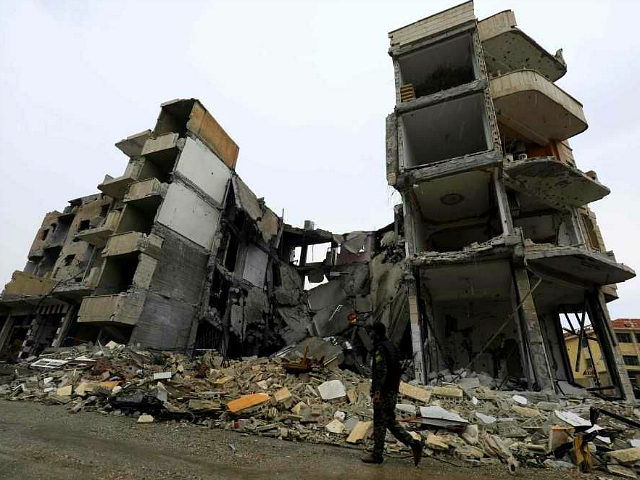International humanitarian group Doctors Without Borders reports that, over six weeks after its official liberation, the former Islamic State capital of Raqqa in Syria is still littered with booby traps, land mines, and discarded munitions.
Forty-nine patients with blast injuries have been treated at the group’s clinic in Raqqa in just the past ten days.
“When we first visited the Al Meshlab neighborhood, it was pretty much deserted, but on our latest visit, people were returning slowly to check on their houses. Some have found their homes in ruins; others have found dead bodies and explosives in their houses, gardens, and streets. Everyone fears setting off booby traps when entering buildings or stepping on something that may explode,” said Craig Kenzie, leader of the Doctors Without Borders emergency response team in Raqqa.
“With many roads damaged or blocked, it can take up to two hours by ambulance to reach the nearest hospital with surgical capacity. As a result, people with critical injuries are at risk of dying before or during the journey,” the Associated Press notes.
Oliver Hall, a 24-year-old British man who joined the Kurdish YPG militia just three months ago to help combat ISIS, was killed last week while attempting to defuse what the YPG described as a “booby trap” in Raqqa.
A Kurdish representative in London clarified that Hall was killed while “clearing and dismantling mines.” He reportedly had no prior military experience and received only two weeks of military training at a YPG academy before deploying with a group of volunteers from the U.K. and U.S.
Even without the booby traps, conditions in bombed-out sections of Raqqa are described as extremely difficult by Doctors Without Borders. Residents returning from refugee camps described finding houses damaged or destroyed by airstrikes, making it difficult to endure sub-zero nighttime temperatures. Some of the returnees said their damaged homes were nevertheless preferable to living in refugee camps.
“Many of the houses that still stand in Al Meshlab bear the scars of war,” said Kenzie, referring to one hard-hit neighborhood in eastern Raqqa. “They have bullet marks, shattered windows and holes from explosions. The streets are full of rubbish and personal belongings. Many buildings have been ransacked and there are numerous roads blocked with burnt out cars.” He said:
From what we see, the fighting that took place here was extremely intense. There are all kinds of explosive devices among the rubble. The fighting may have stopped, but people are still getting wounded. It’s devastating to see people who have experienced fighting, insecurity, and displacement, who have already lost so much, still at risk of injury and death. Our medical teams are ready to respond to the surgical needs of people with catastrophic and life-threatening injuries.
The BBC reported in November that the damage to Raqqa might have been even more extensive without a “dirty little secret”: a deal secretly made with hundreds of ISIS fighters by local officials to allow them to secretly depart Raqqa with their families, weapons, and ammunition.
According to the convoy drivers interviewed for the article, the ISIS militants booby-trapped the escape vehicles and threatened to blow up the entire convoy if anything went wrong with their escape. Even their wives and children were wearing suicide belts.
“Has the pact, which stood as Raqqa’s dirty secret, unleashed a threat to the outside world – one that has enabled militants to spread far and wide across Syria and beyond?” the BBC wondered.

COMMENTS
Please let us know if you're having issues with commenting.